
One of our main priorities is to ensure universal access to, and informed use of effective contraception. Millions of people lack the knowledge and information to determine when or whether they have children, and they are unable to protect themselves against sexually transmitted infections (STIs).
Articles by Contraception
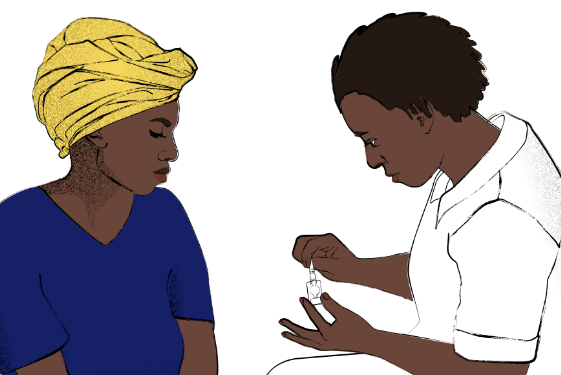
Rolling out self-managed contraceptive care to women and young people in Zambia
The COVID-19 pandemic has caused huge disruption and restrictions for individuals globally, and has been felt acutely with challenges to accessing sexual and reproductive healthcare. Yet, with challenges often come opportunities, and the pandemic has enabled a transformation in how we deliver health and contraceptive care – especially to women and girls who are among the most affected in times of crisis. Adapting in a crisis to meet need Like many of our Member Associations, Planned Parenthood Association of Zambia (PPAZ) acted swiftly in March 2020 to develop a new and efficient strategic approach to healthcare delivery for its clients. PPAZ introduced an initiative that, for the first time, offered self-managed contraceptive care to women and young people across the four districts of Choma, Livingstone, Lusaka, and Kitwe. The PPAZ healthcare team identified eligible women to participate in the initiative through group counselling sessions on contraceptive methods (both hormonal and non-hormonal) via healthcare clinics and community outreach. The provision of accurate and easy-to-understand information on the types of contraceptive methods available gives women the knowledge and autonomy to make decisions about what method is right for them and their lifestyle. Personal and convenient contraceptive care Women who opted for oral contraceptives were provided with a six-month supply of Combined Oral Contraceptives (Microgynon, Zinnia-F), free-of-charge. Other women chose Sayana Press, which is the only self-administering contraception available in Zambia. They were trained on the correct technique for administering the dose (an injection in either the anterior thigh or abdomen), correct storage, and safe needle disposal. Effective for 12 weeks, the women were given a two-dose supply free-of-charge. PPAZ healthcare teams trained 1,535 women on the Sayana Press method, and 3,070 doses of the contraceptive were provided. They also provided follow-up appointments with their clients over several months to ensure correct use and address any concerns. Impressed with PPAZ’s presentation and discussion about how Sayana Press works and its benefits, 21-year-old Eunice Chikoti, chose the injectable because of its convenience. “They took time to explain how to self-inject and were very patient while doing so. They answered all my questions until I was satisfied,” she says. Despite her initial apprehension, Eunice was trained in how to self-inject safely and easily, “I thought it would be very difficult to self-inject, but once I followed the instructions of the nurse, I did so without any challenge,” she says. Eunice has a nine-month-old baby and hopes to have more children in the future. Commitment to self-managed care Due to the success of this strategy, which is not solely reliant on a healthcare provider, PPAZ plans to roll out the initiative to other districts across Zambia. This approach will ensure the most marginalized and low-resource settings are reached where access to healthcare and trained professionals is limited. PPAZ’s initiative has gone a long way in advancing the rights of women and young girls to sexual and reproductive healthcare. Through self-management of their contraceptive needs, women and young girls are exercising their right to bodily autonomy and personal choice with confidence.
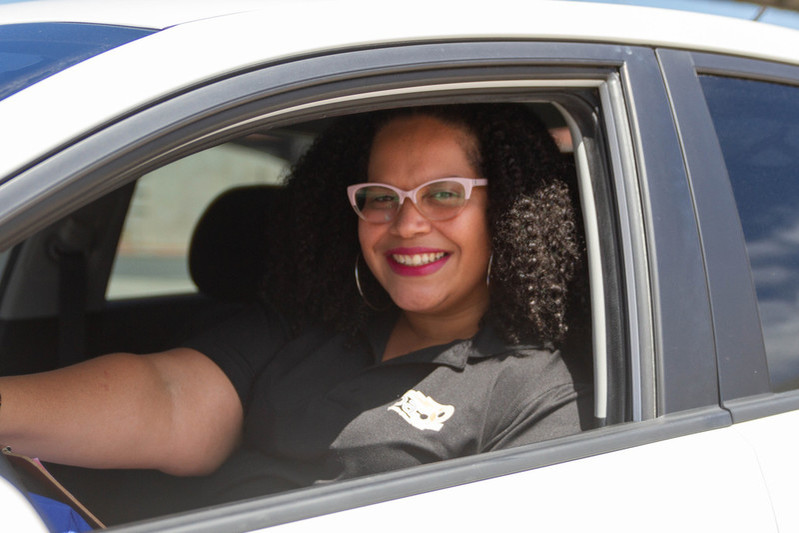
The personal contraceptive delivery service
When Famia Planea Aruba (FPA) saw a gap in the market, the team developed an online contraceptive store and bespoke delivery service to better reach their clients. The online store is available in the local Aruban language, Papiamento, and has been designed to provide quick access to various contraceptive methods, with supporting information to help clients make choices based on their needs. Ghislaine, Head of Information, Education and Communication Support at FPA has been managing the delivery service since it started in August 2018. “Since the start of the delivery service in 2018, our clients were enthusiastic however, the usage started slow. I believe this was due to the unfamiliarity, and people were still in the transition phase to online services. Moreover, clients believed that the delivery transportation would have been in a car, completely covered in images of condoms, sperm cells and pills, which made them sceptic of using the service due to embarrassment”, says Ghislaine. The site is accessible to both FPA members and non-members who can shop in privacy for their contraceptives and schedule a delivery. Orders are delivered by FPA staff with clients having the option to pay cash or debit upon delivery. To ensure a clients’ privacy and confidentiality orders are delivered discreetly. Challenges and opportunities As with any new service comes challenges as well as opportunities. “Some of the challenges we face are the overload of deliveries on one day.” Even though Aruba is a small island and there are traffic jams only at specific hours in the day. “Sometimes I get stuck in traffic and try to rush myself to deliver the products in the time slot and at times I find myself in places that I barely recognize and discover new locations.” “The part I enjoy is the communication with the clients. Building a relationship with the client and vice versa provides a smoother transition of service but also provides the comfort and safe feeling for the client.” Ghislaine says the service often calls for more than the delivery of contraceptive orders, as clients may have questions or need support about their health. Personal and convenient healthcare Damara is a data analyst and a member of the Sustainable Development Goals Commission. She started using FPA contraceptive delivery service a year ago. “It definitely has made my life much easier, especially when I have a busy schedule. With the delivery service I simply order my products through the online store and choose the date and time that is most convenient for me”, she says. Damara values the personal service and the convenience of paying by card and choosing a preferred delivery time. “I love this service because sometimes I place an order a few days before and the employees at FPA call to confirm the order the day of the delivery, which is great because it is like a personal reminder! The best part is that they also have a portable ATM machine. I get my products, guidance and have it delivered to my location, what more can you ask for?” FPA’s bespoke healthcare delivery has seen a successful growth since it started, with an increase of 115% during 2019 and 170% in 2020. “There has been an immense increase in the service in 2020 due to the pandemic. We already had the service in place, so we just had to fill in the gaps; for example, providing more hours and dates for clients to make use of the service”, says Ghislaine. Hilyann, a journalist, is another regular user of the online store. “Shopping on the FPA online store makes me feel very in control and empowered. I hope that more people of all ages take advantage of this service. I hear far too often that people say they don’t have time, nobody has actually, but FPA is there for you. Take control of your sexual and reproductive health, empower yourself, be the boss of your time and your body.”
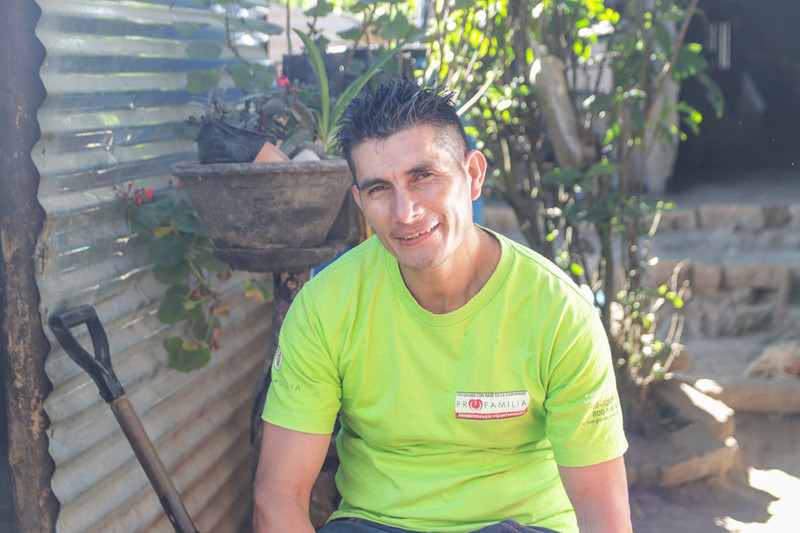
"I changed first...so can other men"
"One day, when I returned from work, Ms. Glenda and Mr. Martin from Pro-Familia were at my house. I heard what the volunteering was about, regarding the education of the men in the community, how to teach how to stop machismo, to be less violent, how to give the talks and visit the clients. They also talked about the contraceptive methods, medicines and many things that would change people's lives. The proposal seemed important to me and I accepted, since I like to work for my people," recalls José. In 2008, the Asociación Demográfica Salvadoreña (Pro-Familia) developed a project focusing on sexual and reproductive health and the active participation of men in rural areas. It concentrated specifically on the integration of male participation in sexual and reproductive healthcare. Since 2014, the project has been integrated into the Community-Based Programme as part of the provision of healthcare for rural men. "When I gave the talks on masculinities, they questioned me: 'Why can't you scream at home, if you're the man?' Or 'who do you think you are to say those things?', questions that I also asked myself once", says José. "Thanks to the training I have had and the support of the Pro-Familia staff, I have managed to learn and clarify my doubts. I take care of my own health, I share the responsibilities at home, I take care of my two-year-old son – before volunteering, I thought it was a woman’s job, I didn't do that." Ensuring access to information and contraception Educational activities in sexual and reproductive health remain a challenge, but Pro-Familia is committed to delivering their strategy. The role of the health promoter is to advocate – with other men – the use of contraception, counselling couples, and providing supplies (especially condoms) and medicines. "I like the communication I have with the Pro-Familia staff, and the training reinforcements – they should keep it that way, because it's the way to learn and do things better in the community," he says. "The change begins with oneself and then transmits it to others. I gather men in talks, make visits to their homes, give guidance on prevention of sexually- transmitted infections, on family planning, and how not to be violent", says José. "Older adult men are more difficult to change." Increasing contraceptive use among men José has seen the positive change among men in his community and those small achievements encourage him to keep going. "When men ask me about violence and condom use, I feel encouraged. For example: a co-worker uses a condom and confidently tells me that he does it because he learned from the talks he received, that motivates me to continue guiding towards new masculinities." The Community-Based Program has a special fund for clients who are referred by promoters for a voluntary surgical contraception (VSC) procedure, so the service is free of charge for clients. In this regard, José is aware that there is still work to be done: "The issue of vasectomy is difficult with men in the community, the challenges continue." "In the community, young people 'get to live together' [marital union] at an early age. Maybe I cannot change that, but I can help them to be better people, to respect each other. Just as I changed, so can other men," says José.
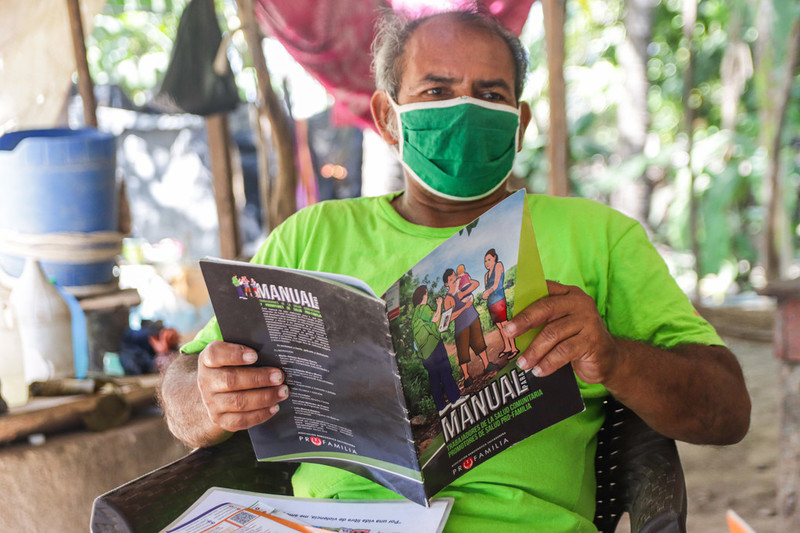
Talking about contraceptive choice on the soccer field
"I decided to become a volunteer at Pro-Familia when I heard a talk the staff were giving at the Acajutla City Hall, where they explained what they were doing in the communities with the program, and they invited us to be part of the volunteer service. I liked what I could do with the men in the community. It’s been two-and-a-half years." Juan Martinez Leon is a volunteer with the Asociación Demográfica Salvadoreña (ADS/Pro-Familia) community-based programme. Juan’s remit is broad, working mainly with men to provide information on contraceptive methods and counselling to individuals and couples. He also provides contraceptive methods including the Pill, injectables and, especially, condoms. For some hormonal contraceptive methods, Juan refers his clients to Pro-Familia clinics or other public health facilities. Putting community first "I like to work for my community, despite the difficulties, and I help in four more communities for them to have the [contraceptive] methods and medicines, because they come to get me," says Juan. "I give talks on the soccer field in front of my house or I have meetings at my house. My children help me invite men to come and they also learn and admire the work." Juan visits clients at home and organizes talks – mainly with other men – to promote the importance of contraceptive use, and women and children's health. The importance of men’s health and their family group is a key element in Juan's role as a health promoter. “I like providing family planning counselling, because sometimes men don't like women using anything to prevent pregnancy. When I talk with the men of my community, people's lives change and you see the difference: you no longer see the domination over women, they let women plan, and [the woman] no longer requests the method secretly – although there are still some women who hide from their husbands. That's why we have to continue working on counselling, that's what awakens them." Changing behaviour and attitudes Juan runs informative talks on reproductive health and the prevention of STIs and HIV. "In some talks, some men have come out angry and questioned me. Who am I to tell those things? ‘Someone who has learned and who respects people's rights,’ I tell them. Now men come to ask for condoms, and even my wife confidently gives the condoms to them. She also supports me." Some men thank Juan for having "awakened their minds", and encouraged them to change to respect women and to help at home. “I think I help my community a lot. You wake them up. I like what I do, I like to help. Before there was no promoter and they had women submerged. Little by little that is changing, but only by talking to men is it achieved. I want to continue learning about sexual and reproductive health issues, it never ends. I would like to continue in training as we used to before the pandemic, and for Pro-Familia to come more often. Until God tells me, I feel that it is my obligation to attend to men or whoever seeks me to help them. That's what I'm for.”
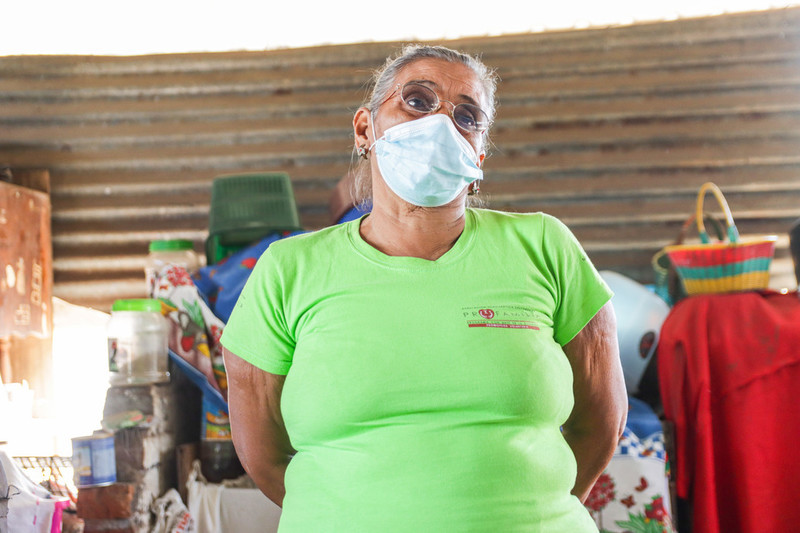
"I am for my community"
"I started as a Pro-Family Health Promoter 30 years ago. I received a visit from Pro-Familia staff on several occasions and I was very interested in what I could do to help in my community as a volunteer, so I accepted. I was trained in sexual and reproductive health issues, and in the technique of injecting [contraceptives]", says Juana Margoth. Since 1974, the Asociación Demográfica Salvadoreña (ADS/Pro-Familia), has been providing sexual and reproductive healthcare to marginalized communities in rural and peri-urban areas. Through their Pro-Family Health Promoter and community-based programme, the Pro-Familia teams provide information and contraceptive care and supplies to vulnerable populations. Today, the programme has around 900 health promoters throughout El Salvador. Building relationships and trust Juana Margoth is one of these health promoters who provides care across four local villages in Hacienda El Edén, in Sonsonate, where the Ministry of Health does not have a presence. "I like that women know that I am here to help them, also to give advice and understand each person's problem; [to help them] to plan their family, and I like the fact that they want to do it with me," she says. She receives a quarterly supply of contraceptives that she distributes at low prices to the women in her community. "I make visits in the communities to the clients I already have, to see if they are okay with the [contraceptive] method, and to receive new clients. Sometimes even the same clients tell me that there is someone who needs a visit. I like that they look to me to help them – I give confidence to the clients, to their partners too. I have clients since two, five or six years ago. There is a lot of need, so I am here, until God wants it." Providing contraceptive advice Juana Margoth also highlights the importance of guiding women and men, providing counselling to clients so that they understand the different methods and contraception, and how to use it: "In other places they only give the contraceptive methods to women and do not explain [on its use]." Veronica has been a regular client of Juana Margoth’s for eight years, receiving counselling and contraceptives. "Margoth has changed our life, mine and my family’s, I have been planning with her for eight years, she is kind and always has the method I use. When I have doubts, I ask her with confidence, without shame, and I can go to her house at any time, she is always there. I don't like going to the health unit, because it costs a lot of money, and sometimes they don't have contraceptives; nowadays, with the pandemic, we have Margoth close and she never stopped treating me, it is very helpful in our community." Responding to humanitarian disasters As well as the community-based programme, Pro-Familia supports the network of volunteer promoter's humanitarian crises, such as natural disasters. Pro-Familia conducts a survey of needs and responds with support for reconstruction, healthcare, and food security. "I have a lot to thank Pro-Familia for. I have learned and continue to learn with them, they are always there when I need to know something, when I run out of contraceptives and without medications [for the program]; I am also grateful because I have my prefabricated house thanks to Pro-Familia who helped me when the earthquake of 2001 happened, several years ago."
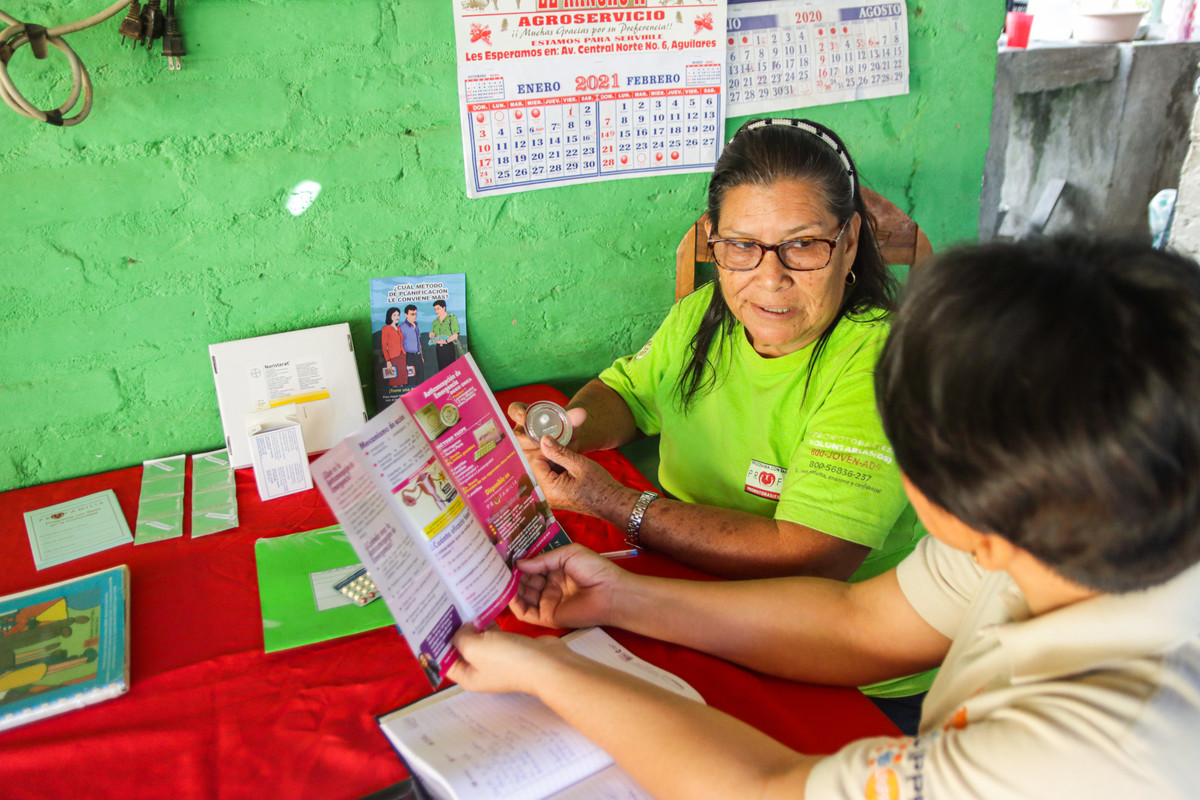
"I can always do something to help others"
When Blanca started volunteering with the Asociación Demográfica Salvadoreña’s (ADS/Pro-Familia), she committed to her new role with enthusiasm. Her thoughts were about how the women of La Loma village would benefit from being able to access contraceptive methods close to home. "Many women walk up to an hour-and-a-half from the villages of the Guazapa Hill to receive family planning services, or to receive counselling," 61-year-old Blanca Edith Mendoza Ramos says proudly. Her house is a cosy and special place for the clients. "I have been a Pro-Familia volunteer for 29 years. When I started, I had already had my five children. I was busy at home, but when the Pro-Familia staff explained to me about working in my community, I trusted it was important to support women. I have learned a lot and I continue to do so. I have received training that helps me to be a better person, to have knowledge and to give good advice; I have received many people from Pro-Familia in these years, and always with great responsibility", she says. A confidential and cosy place To ensure her clients’ confidentiality, Blanca has created a private room with a sofa where she provides counselling and administers injectable contraceptive methods. By creating a private space, Blanca has built up trust in the community and women prefer to go to her for contraception and advice. "I am proud to help in my community. I visit clients to see if they have any side effects, when they do not come to receive their method, to know if they are well, or to recruit new clients who are encouraged to use a family planning method, because their families are already very large." Although the public health facility provides free healthcare, women from other local communities prefer to see Blanca because she is closer and offers confidential personalized care. "The Health Unit is not close, so women prefer to plan with me. They come with confidence to apply their method. On their first visit, I ask them a few questions about their health, and if everything is okay, they plan with me. I think that family planning is important for the spacing of the children and that it is not only the use of methods, but also communication with the couple", reflects Blanca.
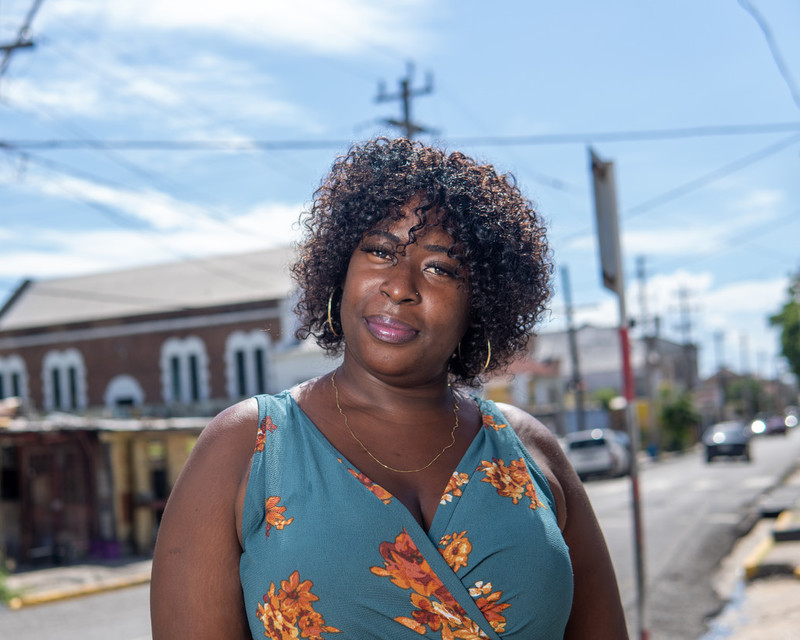
“There’s a lot going through these teenagers’ minds”
Fiona, 28, joined the Jamaica Family Planning Association (FAMPLAN) Lenworth Jacobs Clinic in 2017 as a volunteer through a one-year internship with the Jamaica Social Investment Fund. “I was placed to be a youth officer, which I never had any knowledge of. Upon getting the role I knew there would be challenges. I was not happy. I wanted a place in the food and beverage industry. I thought to myself, ‘what am I doing here? This has nothing to do with my qualifications’. It was baby mother business at clinic, and I can’t manage the drama,” Fiona says. Embracing an unexpected opportunity Fiona’s perception of FAMPLAN quickly changed when she was introduced to its Youth Advocacy Movement (YAM) and began recruiting members from her own community to join. “I quickly learnt new skills such as social media marketing, logistics skills and administrative skills. In fact, the only thing I can’t do is administer the vaccines. They have provided me with a lot of training here. Right now, I have a Provider Initiative Training and Counselling certificate. I am an HIV tester and counsellor. I volunteer at health fairs and special functions. I will leave here better than I came.” Working with vulnerable communities The Lenworth Jacobs Clinic is located in tough neighbourhood in Downtown, Kingston. Fiona says there is vital work to be done, and youth are the vanguards for change. “It’s a volatile area so some clients you have to take a deep breath to deal with them as humans. I am no stranger to the ghetto. I grew up there. The young people will come, and they’ll talk openly about sex. They’ll mention multiple partners. You have to tell them choose two [barrier and hormonal contraception] to be safe, you encourage them to protect themselves,” she says. Other challenges that young people face include sexual grooming, teenage pregnancy, and violation of their sexual rights. “Sometimes men may lurk after them. There is sexual grooming where men feel entitled to their bodies. A lot are just having sex. They don’t know the consequences or the sickness and potential diseases that can come as a result of unprotected sex. Many don’t know there are options - contraceptives. Some don’t know the dangers of multiple sex partners. The challenges are their lifestyle, poverty level, environment, and sex is often transactional to deal with economic struggles,” Fiona explains. Providing a safe space to young communities Despite these challenges YAM has provided a safe space for many young people to discuss issues like sexual consent, sexual health and rights, sexuality and provide them with accurate information access to FAMPLAN’s healthcare. But there remains a need for more youth volunteers, and adults, to support FAMPLAN’s work. “We need more young people, and we definitely need an adult group. Teens can carry the message, but you’re likely to hear parents say, ‘I’ve been through it already’ and not listen. They also need the education YAMs have access to, so they can deal with their children, grandchildren and educate them about sexual and reproductive health rights. For my first community intervention a lot of kids came out and had questions to ask. Questions that needed answers. I had to get my colleagues to come and answer,” Fiona says. YAM’s impact goes beyond sexual and reproductive health, as the group has supported many young people on issues of self-harm and depression. “There’s a lot going through these teenagers’ minds. Through YAM I have developed relationships and become their confidante, so they can call me for anything. The movement is impacting. It helped me with my life and now I can pass it down. YAM can go a far way with the right persons. Whatever we do we do it with fun and education – edutainment.”

“It’s so much more than sex and condoms”
‘Are you interested in advocacy and reproductive health rights?’ These were the words which caught Mario’s attention and prompted him to sign up to be part of the Jamaica Family Planning Association (FAMPLAN) Youth Advocacy Movement (YAM) five years ago. At the time, Mario was 22 and looking for opportunities to gain experience after graduating from college. From graduate to advocate “I was on Facebook looking at different things young people can do, and it popped up. I had just left college with an Associate Degree in Hospitality and Tourism Management. I was unemployed and I just wanted to be active, give myself the opportunity to learn and find something I can give my time to and gain from it,” Mario says. Interested in volunteering and advocacy Mario joined the YAM to get a new experience and broaden his knowledge base. He says he has gained a second family and a safe space; he can call home. “It’s so much more than sex and condoms. It’s really human rights and integrated in everything we do. Reproductive health affects the population, it affects your income, your family planning, how people have access to rights. It’s cuts across men, women, LGBT people and encompasses everything. My love for working with YAM and being an advocate for sexual and reproductive health rights deepened and I could expand further in my outreach.” His work with YAM has equipped Mario with skills and given him opportunities he would otherwise not have. “I have done public speaking which has opened lots of doors for me. I have travelled and met with other Caribbean people about issues [around sexual and reproductive health]. There’s an appreciation for diversity as you deal with lots of people when you go out into communities, so you learn to break down walls and you learn how to communicate with different people.” Challenging the reluctance to talk about sex The greatest challenges he faces are people’s reluctance to talk about sex, accessing healthcare, and misinformation. “Once they hear sex it’s kind of a behind the door situation with everybody, but they are interested in getting condoms. When it comes to that it is breaking taboo in people’s minds and it might not be something people readily accept at the time. LGBT rights, access to condoms and access to reproductive health for young people at a certain age — many people don’t appreciate those things in Jamaica.” Mario talks about giving youth individual rights to access healthcare. “So, can they go to a doctor, nurse without worrying if they are old enough or if the doctor or nurse will talk back to the parents? Access is about giving them the knowledge and empowering them to go for what they need.” “The stigma is the misinformation. If you’re going to the clinic people automatically assume, you’re doing an HIV/AIDS test or getting an abortion. [So] after the community empowerment, because of the stigma maybe 15 per cent will respond and come to the clinic. The biggest issue is misinformation,” Mario says, adding that diversification of the content and how messages are shaped could possibly help. To address these issues, he wants to see more young people involved in advocacy and helping to push FAMPLAN’s messages in a diversified way. “It is a satisfying thing to do both for your own self development and community development. You’re building a network. If you put yourself out there you don’t know what can happen.”
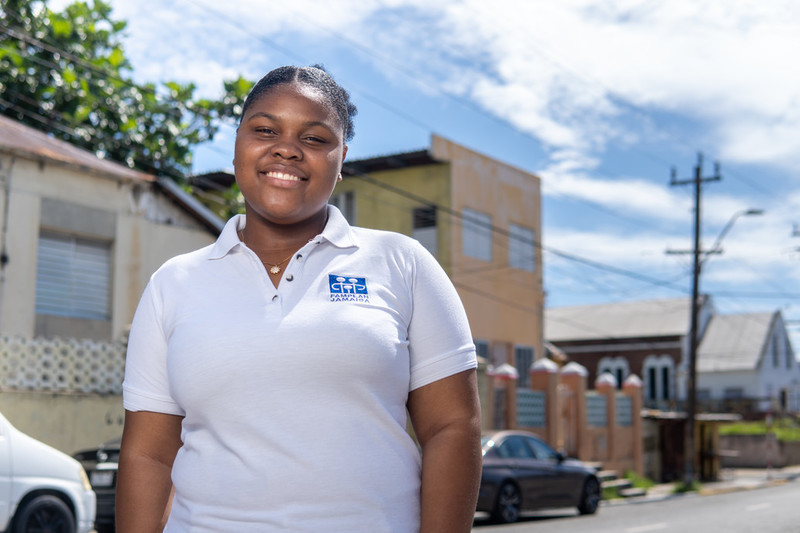
“I wanted to pass on my knowledge”
Candice, 18, joined the Youth Advocacy Movement (YAM) when she was 15 after being introduced to the group by the Jamaica Family Planning Association’s (FAMPLAN) youth officer, Fiona. Sharing knowledge with peers Initially, Candice, saw YAM as a space where she could learn about sexual and reproductive health and rights (SRHR) as there was no information available elsewhere. Candice uses her knowledge and involvement with YAM to educate her peers about their sexual health and rights with hopes that they make informed choices if they choose to engage in sex. “I’ve seen teenagers get pregnant and it’s based off them never knowing routes they could take to prevent pregnancies. I figured I could play a role by learning it for myself, applying it to myself as well as talk to those around me to somewhat enlighten them about sexual and reproductive health. I just wanted to be able to learn for myself and pass on the knowledge.” Making positive changes Candice believes that sexual and reproductive health and rights are not limited to sex, but also about being empowered to make positive changes and choices. Candice has worked with the youth group to use her voice for the voiceless and make a change. “Seeing young girls divert to wanting more and because their parents were not able to provide, they turn to men. Also, I saw undue pressure being placed on girls to not have sex and that pressure unfortunately caused them to develop creative ways to go out and it so ends up that they were left with an unwanted pregnancy. I was learning not only for myself, but to spread the word. I learnt I needed to immerse myself in order to be an effective advocate.” Through her advocacy work, Candice has been to health fairs and spoken to her peers and adults about their sexual and reproductive health and rights. The impact has been positive. “In my circle I’ve seen people become more aware and more careful. In my teaching, my friends are inspired to join so I am looking to recruit soon,” she said. Breaking down barriers to contraception use Candice has faced a number of obstacles, especially around the reservations her peers have to practicing safer sex. “You can only educate someone, but you can’t force them to do what you’re promoting. You will have different people asking and you explain to them and show them different ways to approach stuff and they will outright be like ‘OK, I am still going to do my thing. This is how I am used to my thing’. So, they accept the information, but are they practicing the information? People are open minded, but it’s just for them to put the open mindedness into action.” Candice says there are parents who are not open to discussing these issues with their children and it subsequently makes the work more challenging and prohibits access to safer practices and choices. She believes it would be beneficial for parents to take a more active role in advocating healthy choices. She would also like to see more sexual and reproductive health and rights sessions delivered in schools. “Implement classes in school that are more detailed than what exists. The current lessons are basic and the most compact you’ll learn is the menstrual cycle. You’re learning enough to do your exam, not apply to real life. If this is in schools, the doctors and clinics may be more open to the reality that younger people are engaging in sex. To prevent unplanned pregnancies be more open.” “YAM has good intentions. These good intentions are definitely beneficial to the target audience. With more empowerment in the initiative we can move forward and complete the goal on a larger scale.”
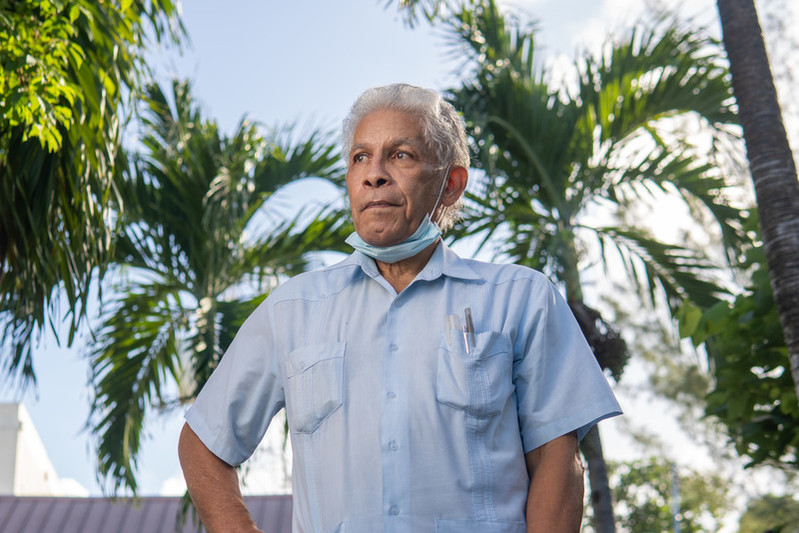
"I saw the opportunity to do cervical screenings"
Dr McKoy has committed his life to ensuring equality of healthcare provision for women and men at the Jamaica Family Planning Association (FAMPLAN). Expanding contraceptive choice Returning to Jamaica from his overseas medical studies in the 1980s, Dr McKoy was frustrated and concerned at the failure of many Jamaican males to use contraception. This led him to making a strong case to integrate male sterilization as part of FAMPLAN’s contraceptive care package. Whilst the initial response from local males was disheartening, Dr McKoy took the grassroots approach to get the buy-in of males to consider contraception use. “Someone once said it’s only by varied reiteration that unfamiliar truths can be introduced to reluctant minds. We used to go out into the countryside and give talks. In those times I came down heavily on men.” Overcoming these barriers, was the catalyst he needed to ensure that men accessed and benefitted from health and contraceptive care. Men were starting to choose vasectomies if they already had children and had no plans for more. Encouraging uptake of male healthcare Dr McKoy was an instrumental voice in the Men’s Clinic that was run by FAMPLAN, encouraging the inclusion of women at the meetings, in order to increase male participation and uptake of healthcare. “When we as men get sick with our prostate it is women who are going to look after us. But we have to put interest in our own self to offset it before it puts us in that situation where we can’t help yourself. It came down to that and the males eventually started coming. The health education got out and men started being more confident in the health services.” Health and wellbeing are vital McKoy advocates the importance of women taking their sexual health seriously and accessing contraceptive care. If neglected, Dr McKoy says it could be a matter of life death. He recalls a story of a young mother who was complacent towards cervical screenings and sadly died from cervical cancer - a death he says which could have been prevented. “Over the years I saw the opportunity to do cervical screenings at the clinic. The mobile unit gave us access to so many patients. We had persons who neglected to do it. One patient in particular - she was not yet 30 years old. She had three children and after every delivery she was told by the hospital to get a cervical screening. She didn’t do it and eventually got cervical cancer. When she was to do the cervical screening, she didn’t come. One morning they brought her and had to lift her up out of the car. At that time doctors said they couldn’t do anything for her. It wasn’t necessary. So, we had to go out more to meet people, educate them teach them the importance of sexual and reproductive health.” That experience was his driving force to continue the work in providing sexual and reproductive healthcare and information through community outreach.
Pagination
- Previous page
- Page 2
- Next page







